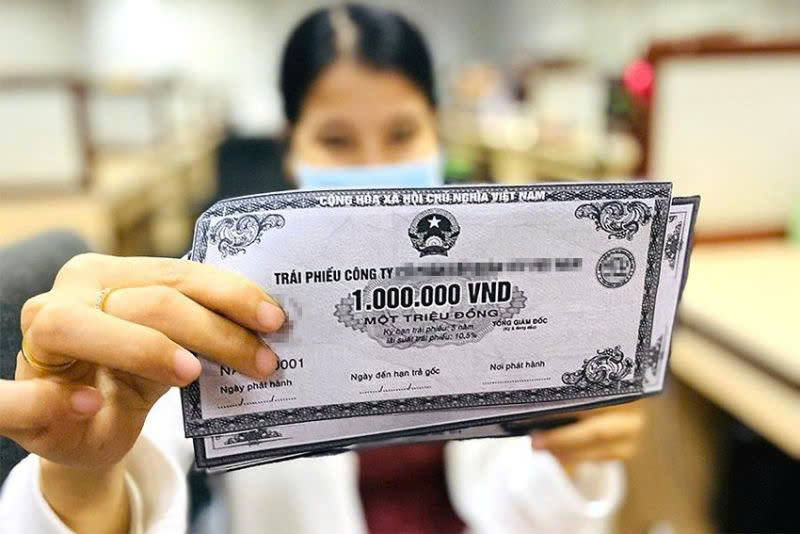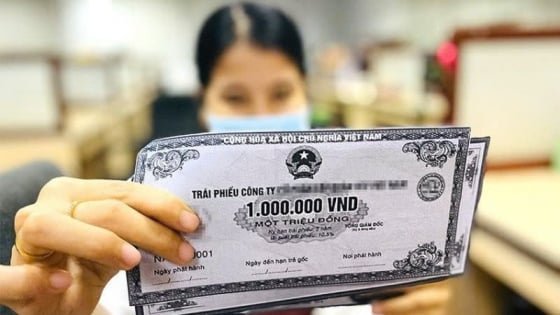By
Assoc. Prof., Dr. Tran Viet Dung
Fri, August 16, 2024 | 8:05 am GMT+7
Multiple solutions including improved information transparency and corporate governance should be synchronously implemented to unlock the potential of Vietnam’s corporate bond market, says economist Assoc. Prof., Dr. Tran Viet Dung.
He says this can contribute to increasing the corporate bond market value to 20% of the national GDP by 2025 and 30% by 2030.

The value of corporate bonds issued in Q2/2024 hits VND91.22 trillion ($3.63 billion). Photo courtesy of Vietnam government portal.
According to the Vietnam bond market report for Q2/2024 by the Vietnam Bond Association (VBMA) and the latest report by the Vietnam Investor Services (VIS Rating), there were many bright spots for the Vietnamese corporate bond market in June and the first six months of 2024. However, there were many difficulties and challenges that need to be addressed, too.
The VBMA report showed that in nearly VND67.8 trillion ($2.7 billion) of corporate bonds reached maturity in Q2/2024. Meanwhile, the value of corporate bonds issued skyrocketed 138% year-on-year to VND91.22 trillion ($3.63 billion) a majority of them from the banking group at VND68.55 trillion, accounting for 75% of the total value.
Meanwhile, the VIS report said that in June, the total value of new bonds issued reached VND69 trillion ($2.75 billion), more than double the VND29 trillion in the preceding month. Most of the new issuances in June and in the first half came mainly from the banking sector.
This showed that bond issuance activities were much more vibrant in Q2 compared to the previous quarter and the surge came from the banking and real estate groups. The reason could be improved credit activities and the need to offset the amount of maturing bonds.
However, the domestic corporate bond market has not developed to its potential. Its size is just 11.2% of GDP, quite modest compared to other countries in the region like Malaysia (53.6%) and Thailand (26.7%).
Outstanding corporate bonds now account for about 8.4% of the total outstanding credit in the whole economy, down 0.5 percentage points from the end of 2023. The figure at the end of Q2 decreased slightly by 3% compared to the end of 2023 to over VND1,170 trillion ($46.56 billion).
The value of bonds with late interest and principal payments in Q2 hit VND11.36 trillion ($452 million), up slightly from Q1. Real estate bonds accounted for the lion’s share, 63%, of the bonds seeing late payment. This has been the case since November 2022.
The fact that most of the new issuances in June and the first half came mainly from the banking sector also reflected the fact that corporate bond issuance activities still faced many difficulties. There was almost no issuance by enterprises in the manufacturing, consumer goods or services sectors. In the secondary market, the majority of transactions were made by the banking group. Among the top 10 issuers with the most traded bonds in the second quarter, six were from this sector.
Solution orientations
It can be seen that the capital demand for business development in Vietnam is very large. The government has also set a target of increasing the size of the bond market to 20% of GDP by 2025 and 30% by 2030. To unlock this potential, it is necessary to synchronously and comprehensively implement several solutions.
Firstly, Vietnam should complete the required legal framework and enhance market supervision capacity; and continue to perfect legal regulations on issuance, trading and management of corporate bonds, ensuring consistency and transparency. At the same time, it is necessary to strengthen the supervision and risk management capacity of state management agencies, thereby minimizing violations and protecting the rights of investors.
Secondly, the government needs to create favorable conditions and operating environments that help companies improve their business performance, thus making bonds issued by them more attractive.
Thirdly, information transparency and strengthen corporate governance should be improved. Enterprises need to fully, promptly and accurately disclose information related to their operations, business results and investment projects, thereby enhancing investor confidence.
At the same time, they should strengthen their governance capacity and apply modern governance standards to improve operational efficiency and minimize risks.
It is also possible to establish a rating culture for the bond market. Credit rating will bring greater transparency to the market and create stronger liquidity. This will serve as a foundation for building investor confidence while ensuring long-term sustainability of the corporate bond market.
Fourthly, Vietnam needs to diversify the types of corporate bonds issued in the market. In addition to issuing bonds to raise capital for production and business activities, it is necessary to encourage companies to issue other kinds of bonds like green bonds, asset-backed bonds and convertible bonds. This will create diverse choices for investors and boost market development.
Fifthly, there is a need to build and develop a system of professional financial intermediaries comprising consulting companies, investment funds and underwriting companies to support enterprises in the process of issuing bonds. At the same time, it is necessary to promote the participation of large financial institutions like banks, insurance companies and pension funds in the corporate bond market.
Finally, it is necessary to continue to promote communications and raise awareness of various issues among stakeholders. This will help businesses better understand the opportunities and benefits of issuing bonds and encourage investors to participate in the market fully and effectively.
In sum, synchronous implementation of the above solutions can unleash the growth potential of the corporate bond market in Vietnam, making it an effective capital mobilization channel for businesses while generating attractive investment opportunities for investors.
* Assoc. Prof., Dr. Tran Viet Dung is director of the Research Institute under the Hanoi-based Banking Academy of Vietnam.
To promote efforts to remove bottlenecks and unlock its potential, The Investor is organizing a workshop on the sustainable and professional development of Vietnam’s corporate bond market in Hanoi on Friday, August 16.
Leaders of various ministries, agencies and associations as well as economists, representatives from commercial banks, securities firms, listed companies, international organizations, and credit rating institutions will participate in this event.

